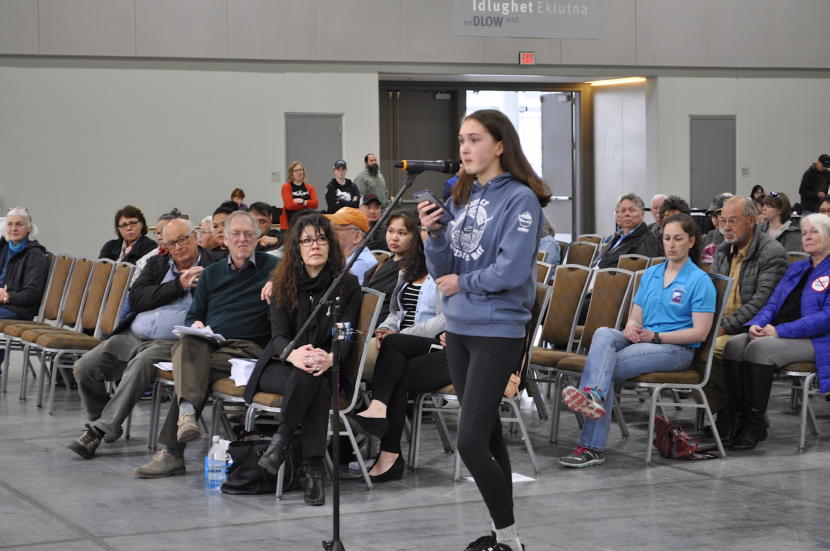
People who oppose the Pebble Mine — and quite a few who support it — came out in force Tuesday for the final Army Corps of Engineers hearing on the proposed mine.
Dozens were in line when the doors opened on the hearing at the Dena’ina Center in Anchorage. Speakers criticized the adequacy of the Corps’ draft environmental impact statement. Many highlighted the importance of the salmon runs in Bristol Bay, downstream from the proposed mine.
“I’m a fifth-generation commercial fisherman,” said 15-year-old Emily Taylor, a freshman at Dimond High School who fishes in the Naknek-Kvichak District every summer. “And the permit I now hold once belonged to my great, great grandmother, Anna Chukan.”
Taylor said she hopes to pass her salmon permit and setnet fishing tradition on to her heirs, but she said a mine could end all that. Her hand shook as she read from her cell phone screen.
“I don’t want my children and grandchildren to have to ask me what it was like to go fishing. Do you think they’ll ask me about this day? What I did to stop it? I don’t want that to become my reality,” she said.
Mine opponents also said they worry about the fisheries of Cook Inlet. Pebble developers want to build a subsea gas pipeline under the inlet. A few speakers said the environmental impact statement should consider the bears of the McNeil River State Game Sanctuary and Refuge, near the proposed pipeline and road corridor.
A sizable minority of speakers — maybe 1 in 3 — argued in favor of the mine. They said mining and fisheries can coexist, and that Alaska needs the jobs.
Former state forester John Sturgeon is a long-time advocate for making use of Alaska’s natural resources. He said the mine can help sustain Alaska once the oil is gone
“I think that the people of Alaska have got a standard of living you’d like to maintain, and if we don’t diversify our economy, that’s not going happen,” Sturgeon said.
Many people from the Bristol Bay region spoke against the mine, but a few said jobs are paramount. Jimmy Hurley Sr. of Ekwok said he had to leave his community and now works in Togiak, hauling fuel. He said salmon aren’t enough for the young people in Ekwok.
“Are they going to be proud of living off food stamps or welfare or all the other things?” Hurley said in an interview after his testimony. “Look at the state right now, with Medicaid being cut and … all these other things that are free stuff. There’s not going to be anything free anymore, so we better get people to work.”
The public comment period closes May 30. The Corps expects to issue its final environmental impact statement early next year, and then decide whether to issue permits.